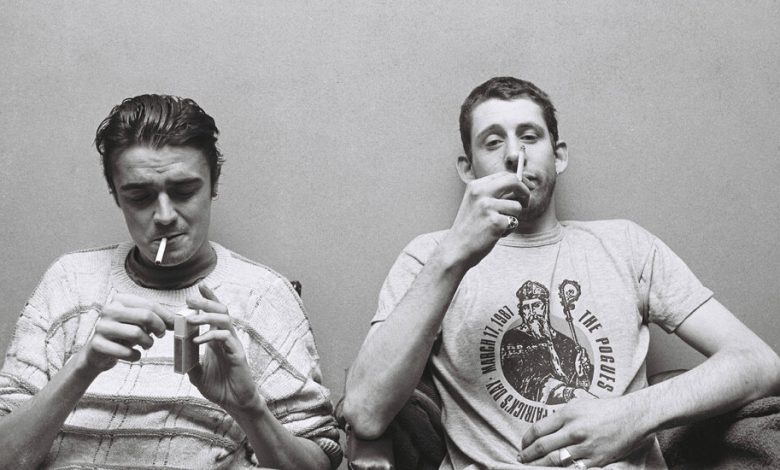‘Fairytale of New York’ Isn’t Like Any Other Christmas Song

I fell in love with “Fairytale of New York,” the indelible Christmas song by the Pogues, before I’d heard a note.
I grew up in the boarded-up, bombed-out Northern Ireland of the Troubles. There wasn’t an abundance of galleries in Derry, where I lived, at the time, and my father would take me to a record store where the sleeves were one of my main early experiences of art. I’d spend hours escaping into the alien worlds of prog rock and heavy metal.
The sleeve of “Fairytale” was different. It was black and white and spare. There was a photograph of a man resting his head on his drink, and his drink on a window. There was a spectacular metropolis outside but he wasn’t looking at it. He seemed impossibly cool, like some wayward, hung-over angel, sick of heaven. I found out later he was Spider Stacy, who played tin whistle in the Pogues.
There was adventure and longing in that image, which was based on a Burt Glinn photograph of Sammy Davis Jr. from 1959. As in the original, there was also hardship, homesickness and awe for a vast, engulfing city. But it also captured something essential about exile that generations of Irish people would understand implicitly.
I grew up hearing migration stories from uncles who’d returned from near fortune and ruin abroad, but it wasn’t until I followed in their footsteps and moved to Britain in my early 20s that I realized how profoundly the Pogues, an Anglo-Irish band, and the frontman Shane MacGowan, who died last month, articulated the experiences of the Irish diaspora.
In Ireland, seeking work has often meant moving to England. The early songs of the Pogues documented what awaited there in the early 1980s — a time when it was, to put it mildly, challenging to be Irish in London. Irish people had been portrayed variously as buffoons, insurrectionists and animals in the British media since Victorian times, and ethnic hate and discrimination were prevalent well into the 1980s. The conflation of all Irish with the Irish Republican Army led to miscarriages of justice like the Guildford Four, the Birmingham Six and the Maguire Seven, who were wrongly imprisoned for I.R.A. bombings in the 1970s.
Irish migrants banded together in places like Kilburn, in northwest London, or tried to assimilate by changing their accents and identities, or risked standing out. Mr. MacGowan, who was born near Kent to Irish parents, and grew up in rural Ireland and southeast England, chose the latter.
He wrote candidly and unapologetically about London-Irish life and mined the Irish literary canon for inspiration. He never hid his Republicanism. The band dressed in suits like Irish laborers in their Sunday best and fused the skill and energy of Irish traditional music with the D.I.Y. inventiveness of punk. Even their name derived, via James Joyce’s “Ulysses,” from a lighthearted Gaelic insult.
I listened to the Pogues in my first years in Britain, a tour of bedsits, dive bars, warehouses and call centers. I’d feel not comforted, but a sense of solidarity. Someone like us had been here before, and found a way to make something out of it that would honor existence.
The Pogues lived in working-class areas like Kings Cross and Camden, and that comes through in the exultant disarray of songs like “Boys From the County Hell” (“And it’s lend me 10 pounds, I’ll buy you a drink/And Mother wake me early in the morning”) or the unflinching “Dark Streets of London” (“And every time that I look on the first day of summer/Takes me back to the place where they gave me ECT”) that drew on Mr. MacGowan’s experience in a psychiatric hospitalas a teenager.
“Fairytale of New York” was a departure, quite literally in one sense: If England was for seeking work, America was for seeking dreams. (“They’ve got cars big as bars/ They’ve got rivers of gold.”) It was also a move away from documenting the reality of their lives. Mr. MacGowan had apparently never been to New York when he started writing it, but dreamed up an enchanted place and a down-on-their-luck couple who’d tried to make it there, and failed.
The song’s title was inspired by a novel of the same name by the Irish American writer J.P. Donleavy. Some of what we know about the song is somewhere between fact and lore — there was either a bet, from Elvis Costello to Mr. MacGowan, that he couldn’t write a downbeat Christmas song, or the band’s managers had simply appealed to them to write a hit. Jem Finer, the band’s banjoist, initially wrote the music as a maudlin sailor’s song, but his wife, Marcia Farquhar, nudged him toward the version we know. Mr. MacGowan wrote the lyrics in a feverish struggle with pneumonia in Malmo, Sweden.
The lines Mr. MacGowan trades with the singer Kirsty MacColl are as much fencing (“You took my dreams from me”) as dance (“I kept them with me, babe/I put them with my own”). It’s as intimate and uneasy as hearing an argument through thin walls, and yet it’s epic, too, conjuring the snowbound canyon-streets of Manhattan. It rejects the Christmas song as snow globe fantasia as effusively as it rejects the delusion of youthful, dewy-eyed romance.
That it is a duet is a perfect expression of another thing that made the Pogues great. The magnetic force of opposites: punk and folk; love and destruction; beauty and brutal honesty; falling snow and pools of vomit.
It’s a fairy tale in the manner of the Brothers Grimm, an unsparing lesson in how life is rather than how it should be. Years wasted in dead-end, badly paid jobs. The self-obliteration that follows in the free time you do have. The falling-apart surroundings and the vulnerability of needing someone else (“Can’t make it all alone/I’ve built my dreams around you”). It’s a song of exile, too. But it’s not necessary to leave the country you’re from for it to mean something to you. You don’t even have to leave home — age will do it.
Some of the London-Irish pubs of the ’80s that the Pogues would have known are still the same today, but the workplaces and digs around them have changed — new precariousness for newer migrants. And “Fairytale” is no longer a cult, alternative Christmas song; it’s ubiquitous. But there are still moments when a line from it can steal upon my soul (“When the band finished playing/They howled out for more”) and remind me of the lesson I first half-wittingly gleaned as a kid in that record store. The life in all of us is worthy of a song.
Darran Anderson is the author, most recently, of “Inventory: A Family Portrait of Derry’s Troubled Past.”
The Times is committed to publishing a diversity of letters to the editor. We’d like to hear what you think about this or any of our articles. Here are some tips. And here’s our email: [email protected].
Follow the New York Times Opinion section on Facebook, Instagram, TikTok, X and Threads.




